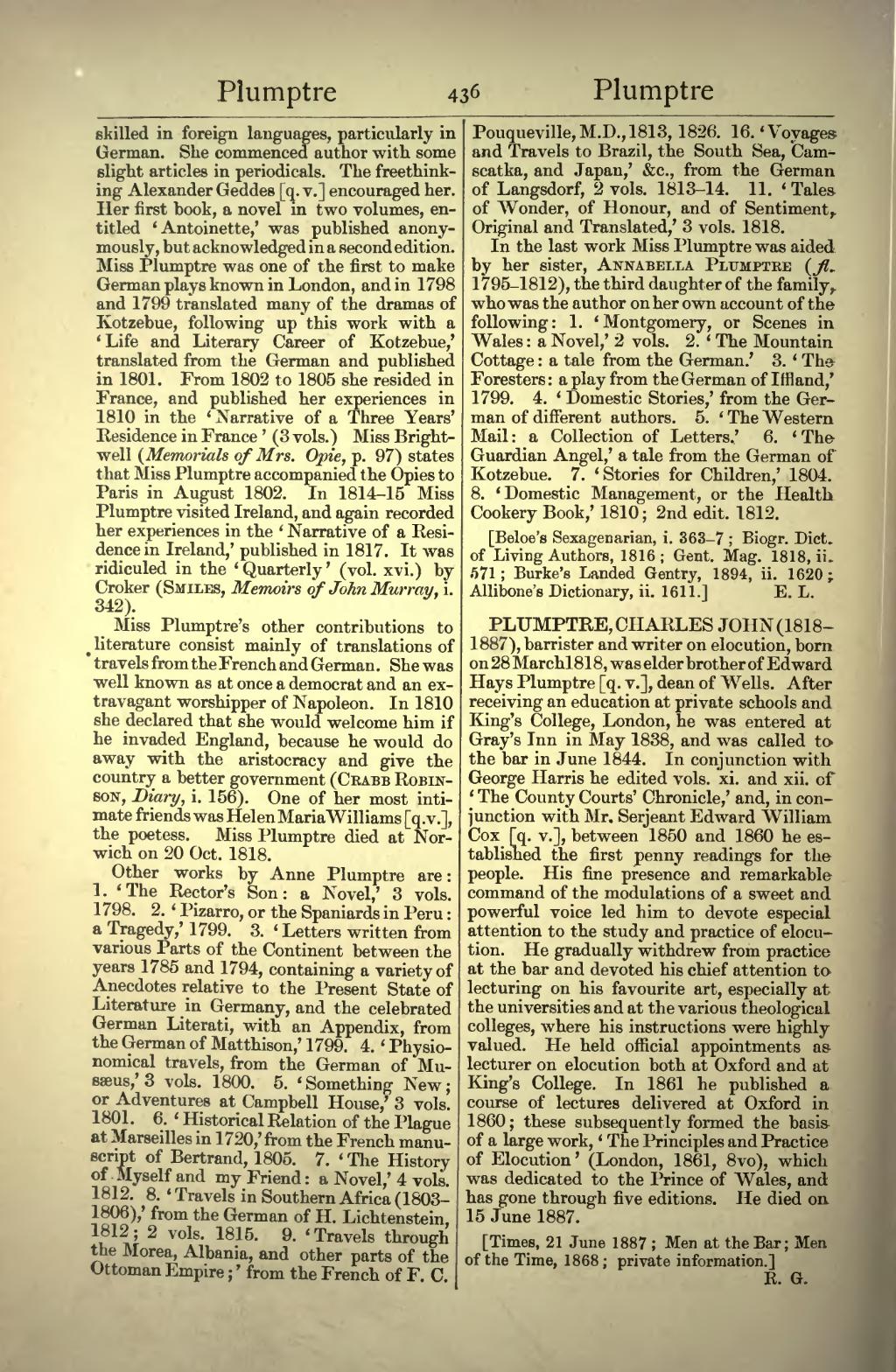skilled in foreign languages, particularly in German. She commenced author with some slight articles in periodicals. The freethinking Alexander Geddes [q. v.] encouraged her. Her first book, a novel in two volumes, entitled 'Antoinette,' was published anonymously, but acknowledged in a second edition. Miss Plumptre was one of the first to make German plays known in London, and in 1798 and 1799 translated many of the dramas of Kotzebue, following up this work with a 'Life and Literary Career of Kotzebue,' translated from the German and published in 1801. From 1802 to 1805 she resided in France, and published her experiences in 1810 in the 'Narrative of a Three Years Residence in France' (3 vols.) Miss Brightwell (Memorials of Mrs. Opie, p. 97) states that Miss Plumptre accompanied the Opies to Paris in August 1802. In 1814-15 Miss Plumptre visited Ireland, and again recorded her experiences in the 'Narrative of a Residence in Ireland,' published in 1817. It was ridiculed in the 'Quarterly' (vol. xvi.) by Croker (Smiles, Memoirs of John Murray, i. 342).
Miss Plumptre's other contributions to literature consist mainly of translations of travels from the French and German. She was well known as at once a democrat and an extravagant worshipper of Napoleon. In 1810 she declared that she would welcome him if he invaded England, because he would do away with the aristocracy and give the country a better government (Crabb Robinson, Diary, i. 156). One of her most intimate friends was Helen Maria Williams [q. v.], the poetess. Miss Plumptre died at Norwich on 20 Oct. 1818.
Other works by Anne Plumptre are:
- 'The Rector's Son: a Novel,' 3 vols.
- 'Pizarro, or the Spaniards in Peru: a Tragedy,' 1799.
- 'Letters written from various Parts of the Continent between the years 1785 and 1794, containing a variety of Anecdotes relative to the Present State of Literature in Germany, and the celebrated German Literati, with an Appendix, from the German of Matthison,' 1799.
- 'Physionomical travels, from the German of Musaeus,' 3 vols. 1800.
- 'Something New; or Adventures at Campbell House,' 3 vols. 1801.
- 'Historical Relation of the Plague at Marseilles in 1720,' from the French manuscript of Bertrand, 1805.
- 'The History of Myself and my Friend: a Novel,' 4 vols. 1812.
- 'Travels in Southern Africa (1803-1806),' from the German of H. Lichtenstein, 1812; 2 vols. 1815.
- 'Travels through the Morea, Albania, and other parts of the Ottoman Empire;' from the French of F. C. Pouqueville, M.D., 1813, 1826.
- 'Voyages and Travels to Brazil, the South Sea, Camscatka, and Japan,' &c., from the German of Langsdorf, 2 vols. 1813-14.
- 'Tales of Wonder, of Honour, and of Sentiment, Original and Translated,' 3 vols. 1818.
In the last work Miss Plumptre was aided by her sister, Arabella Plumptre (fl. 1795-1812), the third daughter of the family, who was the author on her own account of the following:
- 'Montgomery, or Scenes in Wales: a Novel,' 2 vols.
- 'The Mountain Cottage: a tale from the German.'
- 'The Foresters: a play from the German of Iffland,' 1799.
- 'Domestic Stories,' from the German of different authors.
- 'The Western Mail: a Collection of Letters.'
- 'The Guardian Angel,' a tale from the German of Kotzebue.
- 'Stories for Children,' 1804.
- 'Domestic Management, or the Health Cookery Book,' 1810; 2nd edit. 1812.
[Beloe's Sexagenarian, i. 363-7; Biogr. Dict. of Living Authors, 1816; Gent. Mag. 1818, ii. 571; Burke's Landed Gentry, 1894, ii. 1620; Allibone's Dictionary, ii. 1611.]
PLUMPTRE, CHARLES JOHN (1818–1887), barrister and writer on elocution, born on 28 March 1818, was elder brother of Edward Hayes Plumptre [q. v.], dean of Wells. After receiving an education at private schools and King's College, London, he was entered at Gray's Inn in May 1838, and was called to the bar in June 1844. In conjunction with George Harris he edited vols. xi. and xii. of ‘The County Courts' Chronicle,’ and, in conjunction with Mr. Serjeant Edward William Cox [q. v.], between 1850 and 1860 he established the first penny readings for the people. His fine presence and remarkable command of the modulations of a sweet and powerful voice led him to devote especial attention to the study and practice of elocution. He gradually withdrew from practice at the bar and devoted his chief attention to lecturing on his favourite art, especially at the universities and at the various theological colleges, where his instructions were highly valued. He held official appointments as lecturer on elocution both at Oxford and at King's College. In 1861 he published a course of lectures delivered at Oxford in 1860; these subsequently formed the basis of a large work, ‘The Principles and Practice of Elocution’ (London, 1861, 8vo), which was dedicated to the Prince of Wales, and has gone through five editions. He died on 15 June 1887.
[Times, 21 June 1887; Men at the Bar; Men of the Time, 1868; private information.]
